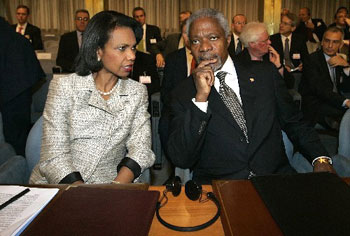
UN Secretary-General Kofi Annan and US Secretary of
State Condoleezza Rice before the start of the meeting on the Lebanon crisis in
Rome, yesterday. -Xinhua/Reuters
The Rome conference achieved virtually nothing yesterday as the participants
failed to agree on how and when a ceasefire could take place between Israel and
Lebanese Hezbollah guerrillas.
U.S. Secretary of State Condoleezza Rice, UN Secretary General Kofi Annan,
Lebanese Prime Minister Fouad Siniora and Italian Foreign Minister Massimo
D'Amato all appeared stone-faced at a press conference following discussions in
the morning.
A statement read out by D'Amato on behalf of the co-chairs -- Italy and the
United States -- said the participants "expressed their determination to work
immediately to reach with the utmost urgency a ceasefire that would put an end
to the current violence and hostilities."
However, it added: "The ceasefire must be lasting, permanent and
sustainable," virtually ruling out an immediate ceasefire.
Rice rejected calls for an immediate ceasefire, saying any ceasefire must
address the root causes and Hezbollah must be disarmed as required by UN
Security Council Resolution 1559.
Annan, on the other hand, urged an immediate cessation of hostilities, saying
a pause of the warfare would offer "crucial hours and days" for essential
humanitarian tasks, including the distribution of relief aid and the evacuation
of non-combatants and the wounded.
Siniora, for his part, said Lebanon wanted an immediate ceasefire. He
cautioned that there was a lot remaining to be done before a ceasefire could be
achieved.
The longer a ceasefire was delayed, the more people would be killed and the
more destruction would be brought, he told the press conference.
Violence continued in Lebanon on Wednesday as Israel showed no intention to
end a 15-day-old massive assault against the Lebanese Shi'ite group Hezbollah,
which kidnapped two Israeli soldiers and killed eight others during a
cross-border clash on July 12.
Hezbollah has demanded Israel free prisoners held in Israeli jails in
exchange for the two captive soldiers, but Israel has so far rejected it,
insisting on an unconditional release.



